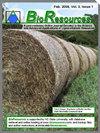Surface functionalization of magnetite nanoparticles for remediation enhancement of phenol from aqueous solutions
IF 1.6
4区 农林科学
Q2 MATERIALS SCIENCE, PAPER & WOOD
引用次数: 0
Abstract
Phenol is a toxic pollutant generated by industries. It can diminish the supply of clean water and is hazardous to human health. Hence, an effective abatement method is important to remove phenol from water sources. The following amine-functionalized magnetite nanoparticles, ethylenediamine (EDA), diethylenetriamine (DETA), triethylenetetramine (TETA), tetraethylenepentamine (TEPA), and polyethylenehexamine (PEHA), were used to study the adsorption performances of phenol from the prepared samples. The morphological study revealed long rod shapes with rough and sharp edges, while the elemental analysis presented the addition of two elements, C and N atoms. In addition, the TETA@MNP possessed weaker magnetism compared to MNPs, showing that the surface functionalization of MNPs was successful. TETA@MNP showed the highest percentage for phenol removal compared to others. The TETA@MNP achieved a removal efficiency of 99.2% at optimum conditions of 60 mg dosage, contact time of 25 min, and pH of 7. TETA@MNP obeyed the pseudo-second-order kinetic model and the Freundlich isotherm model, with coefficients of determination (R2) of 0.9765 and 0.9682, respectively. The reusability study has demonstrated that TETA@MNP can be reused approximately 6 times with extremely minor loss. Therefore, TETA@MNP is a good adsorbent for the adsorption of phenol from prepared sample solutions.磁铁矿纳米粒子的表面功能化用于提高水溶液中苯酚的修复能力
苯酚是一种由工业产生的有毒污染物。它会减少清洁水的供应,危害人类健康。因此,从水源中去除苯酚的有效方法非常重要。本研究使用了以下胺功能化磁铁矿纳米粒子:乙二胺(EDA)、二乙烯三胺(DETA)、三乙烯四胺(TETA)、四乙烯五胺(TEPA)和聚乙烯六胺(PEHA),以研究制备的样品对苯酚的吸附性能。形态学研究显示,样品呈长棒状,边缘粗糙而锋利;元素分析显示,样品中添加了 C 原子和 N 原子两种元素。此外,与 MNPs 相比,TETA@MNP 的磁性较弱,这表明 MNPs 的表面官能化是成功的。与其他材料相比,TETA@MNP 的苯酚去除率最高。TETA@MNP 遵循伪二阶动力学模型和 Freundlich 等温线模型,决定系数 (R2) 分别为 0.9765 和 0.9682。可重复使用性研究表明,TETA@MNP 可重复使用约 6 次,且损耗极小。因此,TETA@MNP 是一种从制备的样品溶液中吸附苯酚的良好吸附剂。
本文章由计算机程序翻译,如有差异,请以英文原文为准。
求助全文
约1分钟内获得全文
求助全文
来源期刊

Bioresources
工程技术-材料科学:纸与木材
CiteScore
2.90
自引率
13.30%
发文量
397
审稿时长
2.3 months
期刊介绍:
The purpose of BioResources is to promote scientific discourse and to foster scientific developments related to sustainable manufacture involving lignocellulosic or woody biomass resources, including wood and agricultural residues. BioResources will focus on advances in science and technology. Emphasis will be placed on bioproducts, bioenergy, papermaking technology, wood products, new manufacturing materials, composite structures, and chemicals derived from lignocellulosic biomass.
 求助内容:
求助内容: 应助结果提醒方式:
应助结果提醒方式:


